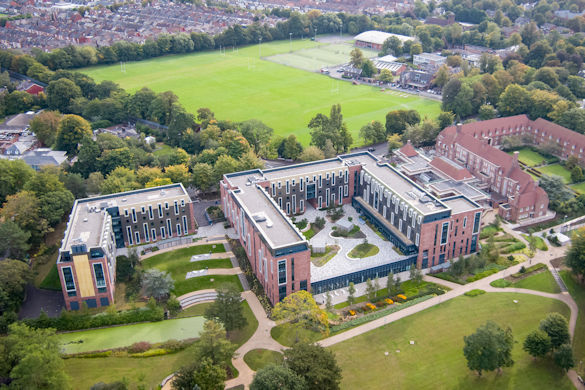
After a series of discussions initiated by our Guild of Students in October 2017, we have decided to rename the former Gladstone Hall of Residence, which has recently been rebuilt as part of our Greenbank Village student accommodation.
Following a nomination process in March, the shortlist of new names for the hall of residence is now available and students are being encouraged to cast their vote next week.
Voting on the shortlist will take place alongside the Guild’s Student Officer election process from Monday, 19 April to Friday, 23 April.
The winning name will be announced on Monday, 26th April.
Our shortlisting committee, made up of representatives from the University and Liverpool Guild of Students as well as Dr Richard Benjamin, Head of the International Slavery Museum for National Museums Liverpool, have put forward the following nominated names for voting:
John Archer (1863-1932)
John Archer was born in Liverpool, and his early years were spent on Mount Pleasant. His father came from Barbados, and his mother was an Irish Catholic. After travelling the world as a merchant seaman, he settled in London, and was elected as a councillor in Battersea. In 1913, Archer was elected as mayor of Battersea by his fellow councillors, becoming the first black mayor in London. Archer was an active Pan-Africanist, and the founding president of the African Progress Union.
Emma Clarke (1876-1905)
Emma Clarke was a pioneering footballer, acknowledged as the UK’s first Black woman to play professionally. Born in Liverpool, she grew up in a family of fourteen children in Bootle. Clarke made her debut playing for the British Ladies Team at the age of 20 (1895) and continued to play until 1903 despite facing racism and sexism on and off the pitch. Her two sisters followed her into the sport, and she continues to be an inspiring figure in the ongoing fight for equality in sport.
Dorothy Kuya (1932-2013)
Dorothy Kuya, born and brought up in Liverpool, was a tireless campaigner for racial equality throughout her life. She was the city’s first community relations officer, and she was a driving force in establishing Liverpool’s International Slavery Museum in 2007, and in instituting the annual Slavery Remembrance Day. National Museums Liverpool have honoured her name in their annual Dorothy Kuya Slavery Remembrance Memorial Lecture.
Anthony Walker (1987-2005)
Anthony Walker, a young man of Jamaican descent, was in his second year of study for his A-levels at Knowsley Hey High School when he was murdered, in an unprovoked and racially motivated attack. The University works in active partnership with the Anthony Walker Foundation, which his family established in his name in 2005 with the aim of tackling racism, hate crime and discrimination.
To find out how you can get involved in the voting process next week, please visit the Liverpool Guild of Students webpages.
Why is Gladstone Hall being renamed?
The decision to rename the hall has been made in recognition of the strength of feeling evoked in our student community by the Gladstone family’s historic ownership of enslaved people, and their profiting from the transatlantic trade in enslaved people.
It is important that the names used within the University, including our Halls of Residence, reflect the values of openness, transparency and respect that underpin our work.
In order to send a clear message about the commitments we have made to our Black, Asian and Minority Ethnic students and staff, as summarised by the Vice-Chancellor’s open letter of June 2020 and the Race Equality and Anti-Racism Action Plan resulting from the University’s Equality and Human Right Commission working group, we have called on our University community to help us to rename the hall.